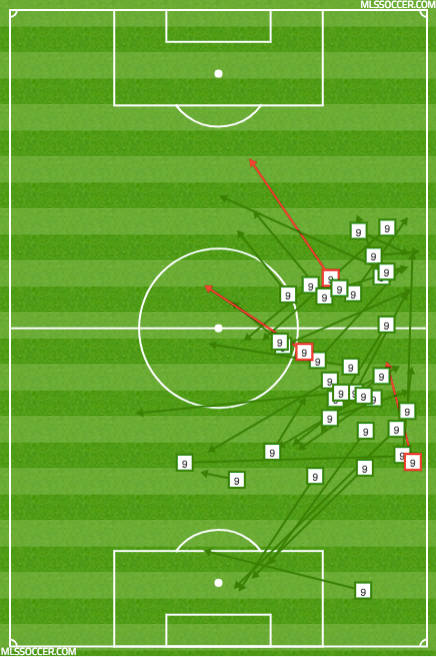Little Things from Week 22: A Healthy TFC, the Galaxy defense, and Adi's Farewell
/By Harrison Hamm (@harrisonhamm21)
Gregory Van Der Wiel and Toronto FC
Toronto FC started their 3-0 win over the Chicago Fire playing a 3-5-2, finally with their best players (Jozy Altidore, Justin Morrow, Victor Vazquez, Chris Mavinga) back. They played fairly well in the first 45 minutes, for the most part stopping Chicago’s attack and avoiding sloppy mistakes at the back. But it was still 0-0 at halftime.
All three goals came after Greg Vanney pulled wingback Ashtone Morgan for center midfielder Marky Delgado, switching the formation to a 4-4-2 diamond. With this change, they were able to get Jonathan Osorio on the ball in the attacking third (he scored the second goal) without sacrificing distribution deeper in the formation. Delgado could shuttle, Michael Bradley could stay home, and the fullbacks could hug the touchline.
Gregory Van Der Wiel, who was the right-sided center back in the first half and the right back in the second, had tried to fill the Delgado role from his center back position. It was an interesting tactical gamble from Vanney, who likely hoped that Van Der Wiel could step into midfield and let Osorio stay forward, keeping the various benefits that the 3-5-2 allows.
Van Der Wiel is an efficient passer — he completes seven percent more passes than expected, and his score is 56.2 — but he doesn’t break lines or distribute the way that Delgado does. Pushing defenders into roles like this is consistent with the Guardiola inverted full-backs trend, and it was a worthy experiment from Vanney. Credit for adjusting in the second half.
The Dutchman’s pass maps from each half (first half is on the left) reflect the change in tactical positioning:
Van Der Wiel 1st half
Van Der Wiel 2nd half
TFC looked really good in the second half, as good as they’ve looked since the CCL final. Hard to say whether they can sustain it, but with their next two games at Atlanta and at home against NYCFC, they’ll have to.
The LA Galaxy’s defending
Excluding own goals, the LA Galaxy have given up 32 goals on 32.2 xGA, a below-average figure, if not at the futility level of MLS’s worst defending teams. They give up 14.4 shots per game, the worst of any current MLS playoff team.
There’s no doubt that the Galaxy’s defense is a prevalent weakness. No game passes without “what were they thinking” moments out of Michael Ciani and Jorgen Skjelvik.
They’ve settled on a 3-5-2 as their preferred formation, trading defensive solidity (they weren’t going to have much anyway, a known fact that probably went into the thought process) for attacking firepower. All four of Zlatan Ibrahimovic, Giovani dos Santos, Ola Kamara and Romain Alessandrini can plausibly play together in this set-up, the only alignment that comes close to getting them all together.
They risked that alignment against LAFC and survived long enough to storm back in the last 10 minutes for a wacky 2-2 draw. They risked it again — albeit with Chris Pontius (a natural winger, of course) in for the suspended Alessandrini — on Sunday against Orlando, and they produced a 4-3 win that lacked any viable defending.
The game against Orlando revealed a lot of the Galaxy’s defensive weaknesses. They were often disorganized and struggled to put pressure on Orlando’s attackers around the box. Defending from the front was always going to be a problem for this LA team, and that major weakness only compounds weaknesses deeper in the formation. They looked a lot better after Servando Carrasco came on as a sub.
42 percent of Orlando’s attacks came down their left side, attacking right-sided center back Dave Romney. Central defenders in a three-at-the-back have to defend in space, meaning they have to possess some measure of athleticism. Romney doesn’t fit the bill. Mohamed El-Munir (usually a left back!) roasted Romney on numerous occasions:
Amidst all the defensive incompetence in Carson, they still managed to give up just 0.91 xG, per Ben Baer, though our model showed them giving up 1.54 xG. They also only gave up 1.61 xG to LAFC. They’re bad, even if recent numbers favor them, but the attack is sparing them a surplus of attacks to blunder.
Adi’s final Timbers goal and the value of emergency defense
As you’ve heard plenty about by now, Fanendo Adi scored in his final appearance as a Portland Timber. His goal proved the difference in a 2-1 Timbers win over the Dynamo, and it exposed more Dynamo defensive weakness:
Houston inexplicably played a five-at-the-back formation against the counter-attacking Timbers. (Wilmer Cabrera’s conservative nature is losing the Dynamo points.) Sebastian Blanco brilliantly dragged Adolfo Machado out of his center back position on this play, forcing wingback Andrew Wenger to step to Blanco and unlock a cheeky give-and-go between Blanco and Zarek Valentin.
Blanco’s first touch in the box was a bit sloppy and forced him to scramble, giving further advantage to the numbers-heavy Dynamo. They shouldn’t have let the Argentine through to begin with, but they had everyone marked by this point. No goal should have been scored from this position.
However, Machado went sliding in on Blanco and missed badly, allowing him time on the ball at the edge of the six-yard box. Blanco’s slip pass to Andy Polo pinged around until Adi managed to have the ball bounce off him into the net. An ugly goal if there ever was one. But emergency defense is a skill, and Houston have decidedly lack that skill.
Earl Edwards Jr. is a weekly starter
This save was lost in the Zlatan show, but Orlando’s Edwards Jr. made the best save of the week on Ola Kamara:
Getting the top-hand to that shot is difficult, and probably the only way he could have saved it. He’s taken Joe Bendik’s job and run with it.
That’s it for this week, check back again after the post-All-Star Game weekend




